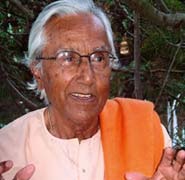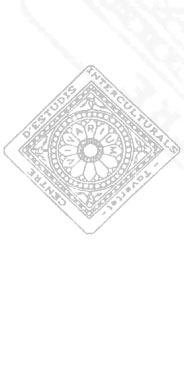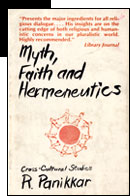

sito ufficiale


Myth, Faith and Hermeneutics
This voluminous and fecund work which appeared originally with the subtitle “Cross Cultural Studies” was born from a harvest of 15 essays all previously published during the 1960s and 70s whose originals were thought and written in four different languages. The book deals with “intercultural studies” since in each of its three sections are gathered (wisely connected) works which consider themes springing from diverse cultures and religions, Chapters 4 and 5, for example, are respectively dedicated to two mythologomena, specifically, to the myths of Prajapâti and Shunahshepa; Chapters 8 and 9 devoted respectively to the smile of the Buddha and to the relation between advaita and bhakti; and, finally, Chapters 13 and 14 dealing with the relation between religion and atheism in the West and the karmic conception of the universe.
The book nonetheless deals with a search that questions even the root paradigms of philosophico-theological (hermeneutical) research: in fact, it puts forward essays that bring to light questions of capital importance in those fields, as in the discussion of the “myth of morality” (Chapter 3), or in the chapter devoted to faith as a constitutive dimension of the human being (Chapter 6), or in the pointed reflections on basic theology and on the philosophical tradition (Chapters 11 and 12). It concludes with an essay that proposes religion as freedom, surpassing (and radically transforming) a classic topos of Western cultural and religious freedom (chapter 16).
It is impossible to capture the complexity of this work, which deserves attentive study in the Panikkarian sense, that is to say, a deep immersion in this honored search impregnated with the human potential for understanding the real. It may be somewhat forced to attempt to identify a “single logical thread” that can “stitch together” these essays, but with great clarity the author suggests at least two possible threads for finding our way in this open exploration.
The first thread (perhaps the only true thread) that gives cohesion to the whole work may well be the “existential legacy” or rather, the experienced personal life, the author’s life experience (“a man who having many original languages does not possess a word of his own… His only salvation springs from the mystic realm, from his life as a whole, from his silent incarnation …”. This encourages us also to live the truth, and to accelerate “the end of the alienating times in which we live”.
The second thread is the one explicitly stated in the subtitle of the Italian edition. The first root of all intercultural arrangements is properly the recognition and open examination of the plurality (essential and irreducible triplicity of our ways of inhabiting and understanding reality. A complete “change of heart and mind” is asked of us. Because “man cannot be reduced to the logos”, nor consciousness to reflective knowledge, the human being is open to the (theanthropocosmic) reality in which he participates, precisely, within a “three-fold veil”.
Myth, to plunge right in, is the horizon against which all hermeneutics is possible; it is present at the root, before any interpretation. It is the invisible light by which we see: it is in relation to all fundamental human behaviors (ideology - Chapter 2, morality - Chapter 3). Its character and power are studied by means of the mythologoumena cited earlier.
The second part of the book is dedicated to faith, which, as the constitutive dimension of the human (a human invariant), is understood as something beyond any monopolization and reductive interpretation (chapter 6). Panikkar offers us, then, a “practical” reflection on faith, dealing with some concrete “developments” from tolerance for silence (exquisite pages on the “dialectic of the name of God”), to advaitic love (Chapter 9) to the four-branched root of the archetypes of ultimate reality (Chapter 10).
The hermeneutics of a myth is no longer the myth but is its logos: which is an equally inevitable horizon whereby we attempt an interpretation of our own experience of life. “Wisdom does not consist of a monochromatic vision of the world, nor of an amorphous atomization ad infinitum, but rather it is a combination of the valuable colors in a universe rich with polarity because it is full of life”.
translation from Italian
